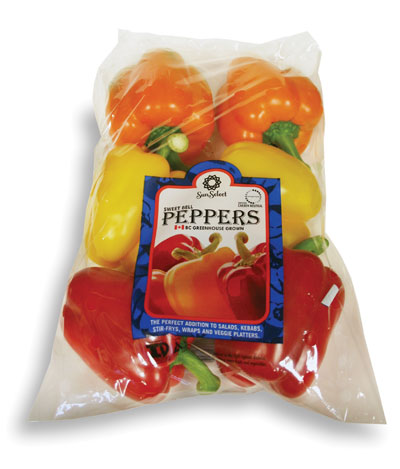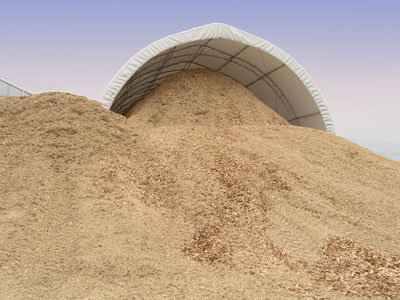
Carbon offset programs create new opportunities for growers
A year after delivering its first shipment of carbon-neutral peppers, SunSelect Produce Inc. of Abbotsford, British Columbia, believes the system can deliver both economic and environmental benefits.
 |
| Carbon-neutral peppers grown by SunSelect. |
 |
| Energy from wood is considered carbon neutral. |
A carbon-neutral product is one in which the emissions of carbon dioxide during production are balanced by reductions or the purchase of credits known as offsets that result in a net environmental benefit. The concept is popular in many industries, including the construction sector, and British Columbia legislators have demanded that the province’s public service be carbon neutral by 2010.
Reinhold Krahn of SunSelect says that the family-run greenhouse invested “many millions” of dollars to install wood boilers and energy screens at its 70 acres of tomato and pepper greenhouses in the Lower Mainland to generate the so-called “carbon credits” that helped it produce carbon-neutral peppers. The project won SunSelect an award from the British Columbia Innovative Clean Energy Fund in 2008.
BURNING WOOD WASTE IS CARBON NEUTRAL
Since burning wood waste releases no more carbon dioxide than wood does when it decomposes naturally, it’s considered a neutral alternative to burning natural gas. The practice garners credits – each one representing the removal of 1,000 kilograms of carbon dioxide from the atmosphere – for SunSelect in consequence.
“By using the energy from wood, you’re not adding any more carbon dioxide to the environment, and so that’s where the reduction in carbon dioxide emissions arises,” Krahn explained. “The difference in carbon emitted is used to calculate your reduction in carbon emissions.”
SunSelect isn’t carbon neutral itself, however.
While it originally used its credits to offset carbon dioxide emissions from its pepper shipments, Krahn said the bigger return has been from selling the credits to other businesses through Vancouver-based Offsetters Carbon Neutral Society. Offsetters pays credit suppliers between $8 and $15 a credit, depending on the investment made to secure carbon reductions.
Offsetters verifies the reduction of emissions at SunSelect on an annual basis and handles the sale of any excess credits the greenhouse generates. SunSelect’s agreement with Offsetters prevents Krahn from disclosing how much he gets from the sale of offset credits, but he indicates that the amount was significant enough to make the transition to woodboilers worthwhile.
“The carbon credit program provided basically a source of funding to allow us to defer some of the capital costs to get there,” he said. “That’s why we participated in it.”
VOLUNTARY OFFSETS MARKET WILL TOTAL $250M IN 2012
Offsetters president and co-founder James Tansey expects the voluntary market for offsets to total $250 million in 2012. But he told growers attending the Pacific Agriculture Show in Abbotsford, B.C., earlier this year that going carbon neutral can also create a marketing opportunity.
“There’s brand equity value in doing these kinds of things,” Tansey said, noting that Vancouver-based Harbour Air introduced a 50-cent a ticket charge to offset flights and become a carbon-neutral air carrier – and saw ridership rise 12 per cent.
The structures are also coming into place to ensure carbon-neutral initiatives are genuine. British Columbia’s Pacific Carbon Trust will issue credits only for projects launched after Nov. 27, 2008, although older contracts for purchasing credits may be eligible for participation in the trust if they expressly mention future projects.
Tansey claims that offsets are often more efficient for an operation than making internal changes in how it does business. “It’s a more economically efficient way of getting to carbon neutrality than by doing it yourself,” he said.
This is partly why SunSelect, when it examined its business, chose to sell its carbon credits to other companies rather than offset the minor amount of emissions its pepper shipments were generating. The environmental benefits of doing what it could to offset what another company might be doing were greater, while generating proceeds that offset the cost of its own carbon reductions.
WESTERN CLIMATE INITIATIVE EXPECTED TO BE IN PLACE BY 2012
Emily Blair, coordinator of the B.C. Agrifood Climate Action Initiative that’s developing a plan for B.C.’s agriculture industry to participate in the market for carbon offsets, said the province is aiming to cut greenhouse gas emissions by 33 per cent from 2007 levels by 2020. The government-owned Pacific Carbon Trust will administer carbon credits prior to the Western Climate Initiative (www.westernclimateinitiative.org) coming into effect (expected by 2012). The initiative includes B.C., Ontario and Québec, as well as seven U.S. states, and will create an international market for the exchange of carbon credits.
Projects considered for offset credits have to go beyond existing best practices to generate offsets.
“They have to be beyond business-as-usual and reduce greenhouse gas emissions,” Blair said of the projects. “I think this is a good system for the greenhouse sector.”
Peter Mitham is a freelance writer and photographer in British Columbia.
Print this page